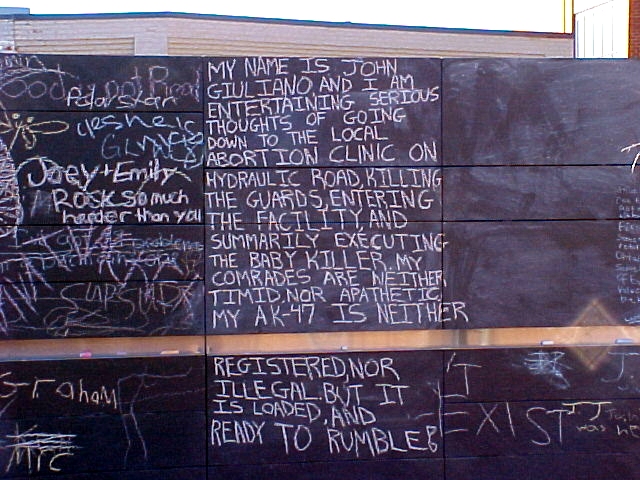|
|
|
|||||



|
"Think you can write anything you want on the Free Speech monument? Think again.When John Giuliano went to the slate wall at the east end of the Downtown Mall on December 27, he says he intended only to exercise his First Amendment rights. But as he walked away from his chalked message, he got a painful surprise: he was taken into custody by Charlottesville police. "They walked up to me on the corner of East Market and Fourth Street and asked me to talk to them," says Giuliano. "I told them I didn't want to talk to them, and I had nothing to say to them." That response didn't fly. After a brief interaction, says Giuliano, the officers handcuffed him and took him to Region 10 for a mental health evaluation. "They perceived my message as a potential death threat," says Giuliano. The episode highlights the critical-- but sometimes murky-- difference between free speech and a threat, and for Giuliano it meant 10 days of lost freedom. The message he wrote, seen in the photo accompanying this story, states his name and that he is "entertaining serious thoughts of going down to the local abortion clinic on Hydraulic Road, killing the guards, entering the facility and summarily executing the babykiller."  The message concludes with information about a potential method for carrying it out: "My AK47 is neither registered nor illegal," he wrote, "but it is loaded and ready to rumble." The 26-year-old Giuliano says he had no intention of actually committing any act and that he has no history of violence. "I don't feel I'm any risk," he says. But his feelings about abortion are powerful. "Moses commands people to put the evil from among us," he says. "I believe that abortion is an evil act because it's the murdering of an innocent child. It was something I felt like expressing. It would have been right to publicly confess it. That's why I wrote it." Police, however, didn't see it that way. "He was detained becase he wrote something that made police fear for people's lives," says Charlottesville Police Sergeant Mike Farruggio. City spokesperson Ric Barrick says police searched Giuliano's home with permission from his mother and "didn't find anything illegal or that would give us reason to worry about his intentions." So where's the line between expressing your thoughts and getting locked up? The answer, say two free speech advocates, is not clear. The Supreme Court has established that threats are not protected under the First Amendment, says Josh Wheeler, associate director of the Thomas Jefferson Center for the Protection of Free Expression. But the high court, he says, "has not done, in my opinion, a terrific job of defining what constitutes a threat." Wheeler says the most recent ruling by the court states that "true threats" are statements in which the speaker "means to communicate a serious expression of an intent to commit an act of unlawful violence to a particular individual or group of individuals." Wheeler says the City attempted to reach him on the day Giuliano was arrested to get his opinion of whether Giuliano's message was protected speech. "The Free Speech wall is simply a monument to the First Amendment," Wheeler says. "It doesn't impart any extra rights beyond what we all have in any situation." Barrick says this is the first such incident at the wall, so the city wanted to be sure it respected Giuliano's civil liberties while protecting those who might be harmed. While courts decide whether certain speech is a "true threat," Wheeler says, "Reading this statement, I could certainly understand how local law enforcement could infer that this constituted a threat." There are fine semantic differences, Wheeler says, between protected speech and a threat. For instance, had Giuliano changed the beginning of his message to read, "I wish someone would go down to the clinic...." and had he not mentioned an AK-47, his message might not have energized the police. John Whitehead, founder of the Rutherford Institute, agrees that Giuliano's message is frightening. "I think that would constitute a true threat," says Whitehead, noting that abortion clinics have been bombed and doctors shot. "They should see if the guy is serious," says Whitehead. "I think the police did a good job here." While Whitehead agrees with Giuliano's pro-life stance, he says he should exercise his right to free speech by protesting in the traditional manner: with a picket sign that states his views but doesn't threaten. Planned Parenthood of the Blue Ridge president/CEO David Nova declines comment on Giuliano's message, saying only, "This is a security matter." Following his arrest, Giuliano says a Region 10 counselor interviewed him before recommending he be involuntarily committed to a psychiatric hospital in Petersburg. Citing confidentiality laws, Region 10's Buzz Barnett would not comment on the situation, noting only that involuntary commitment is a rare step reserved for situations when other measures fail. But Giuliano says once doctors believed he wasn't having homicidal thoughts-- 10 days after his arrival-- they released him. Despite his frustration with his experience at the wall, Giuliano says he won't hesitate to visit it again. "I'll reiterate that I'm still having those thoughts in a different
way," he says. "You can't be afraid to make mistakes in life.""
(Courteney Stuart, The Hook, February 1, 2007)
|
